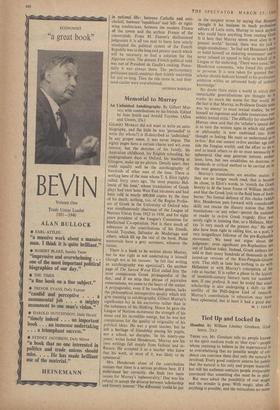Memorial to Murray
An Unfinished Autobiography. By Gilbert Mur- ray, with contributions by his friends. Edited by Jean Smith and Arnold Toynbee. (Allen and Unwin, 25s.)
GILBERT MURRAY did not want to write an auto- biography, and the little he was 'persuaded' to write (by whom?) is ill-described as 'unfinished.' In any proper sense, it was never begun. The eighty pages have a certain charm and wit, even interest; but the sketches of his family, his Australian childhood, his English schooling, his undergraduate days at Oxford, his teaching at Glasgow, make up no picture. Details apart, they could equally well be the autobiography of hundreds of other men of the time. There. is nothing here of the man whom T. S. Eliot rightly called, forty years ago, 'the most popular Hel- lenist of his time,' whose translations of Greek plays had once been West End successes and had been sold in nearly 400,000 copies by the time of his death; nothing, too, of the Regius Profes- sor of Greek in the University of Oxford who was simultaneously chairman of the League of Nations Union from 1922 to 1938, and for eight years president of the League's Committee for Intellectual Co-operation. Nor is there much of substance in the contributions of his friends, Arnold Toynbee, Salvador de Madariaga and others, which fill up the rest of the book. Pious memorials have a grey sameness, whoever the victim.
There is a book to be written about Murray, but he was right in not undertaking it himself, (though not in his reasons : 'he felt that writing an autobiography was egotistical). On another page of The Sacred Wood Eliot called him 'the most conspicuous Greek propagandist of the day,' and if we strip that phrase of pejorative connotations, we come to the heart of the matter. A propagandist, even if he touches genius, lacks the philosophical introspective quality which will give meaning to autobiography. Gilbert Murray's significance lay in his auctoritas rather than in the substance of his thinking. Hence he gave the League of Nations movement the strength of his name and his incredible energy, but he was not conspicuous for the quality or originality of his political ideas. He was a great teacher, but he left a heritage of friendship among his pupils, not a school, no disciples. 'In his ninety-pne years,' writes Isobel Henderson, 'Murray saw his own writings fall steeply from fashion and in- fluence. He accepted it as a teacher who knew that his work, or most of it, was likely to be ephemeral.'
Mrs. Henderson alone of the contributors realises-that there is a serious problem here. If I understand her correctly, she finds two main causes for Murray's 'ephemerality.' One was his refusal to accept the divorce between 'scholarship and literary interest.' The difference 'could be put
in the simplest terms by saying that Housnoo, thought it his business to teach professione
editors of Latin texts, Murray to teach anybocli who could learn anything from reading Greet It is here that Murray seems most alien to tlle
present world.' Second, there was his lack 01
single-mindedness: 'he had not Housman's desire to build himself an enduring monument' and Ile never refused an appeal to help on behalf of the League or the underdog. 'There were some,' Mrs' Henderson comments, 'who found this puzzling
or perverse. It is now taken for granted that 3. scholar should dedicate himself to his profession°! ambition within an advanced body of technical knowledge.' No doubt there exists a world in which these remarkable generalisations are thought to 1)4 truths. So much the worse for that world. 13111
the fact is that Murray, as Professor Dodds notes was `no enemy' to exact textual studies; 'he was
himself an ingenious and subtle (sometimes over' subtle) textual critic.' The difficulty lay elsewhere' Murray once said that the 'scholar's special duty is to turn the written signs in which old pnerrY or philosophy is now enshrined into living thought or feeling. He must so understand as l0 re-live.' But one cannot re-live another age (out' side the Jungian world), and the effort to do so and to teach others to do so must necessarily he ephemeral. One may generate interest, enthus' iasm, love, but one establishes no doctrine, 110 standards or critical method to be carried on bY the next generation. Murray's translations are another matter. If they are no longer much read, that is because he chose, in Eliot's words, to 'stretch the Greek brevity to fit the loose frame of William Morris, and blur the Greek lyric to the fluid haze of Swill' burne.' No formal defence of this choice (which Mrs. Henderson puts forward with considerable skill) can rescue the illusory notion that these translations—or any other—permit the audience or reader to re-live Greek tragedy. Eliot was surely right in insisting that, as a Hellenist, MU( ray 'is very much of the present day.' He mnY also have been right in calling him, as a poet, 'a very insignificant follower of the pre-Raphaelite movement.' We need not argue about the judgment: even significant pre-Raphaelites are out of fashion today. Instead, Greek authors are sold in their many hundreds of thousands in the jazzed-up versions of the Rieu-Penguin-Graves style. That shift in taste has nothing to do with Hellenism or with Murray's conception of his role as teacher. It is rather a phase in the history of twentieth-century literary taste (or tasteless- ness, if one prefers). It may be noted that exact scholarship is also undergoing a shift—to the sterility of the PhD-degree kind of research. Murray's contribution to education may have been ephemeral, but at least it had a good day.
M. I. FINLEY


















































 Previous page
Previous page